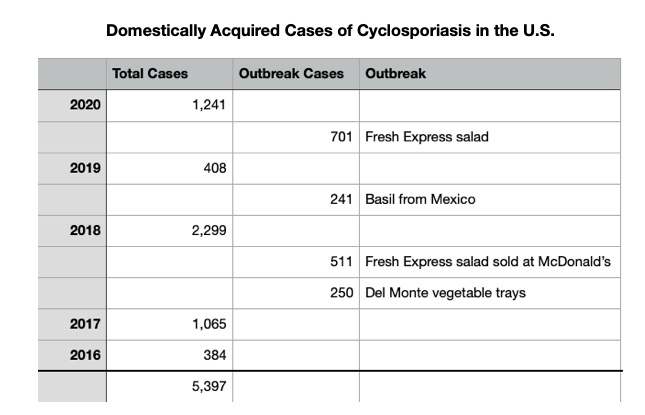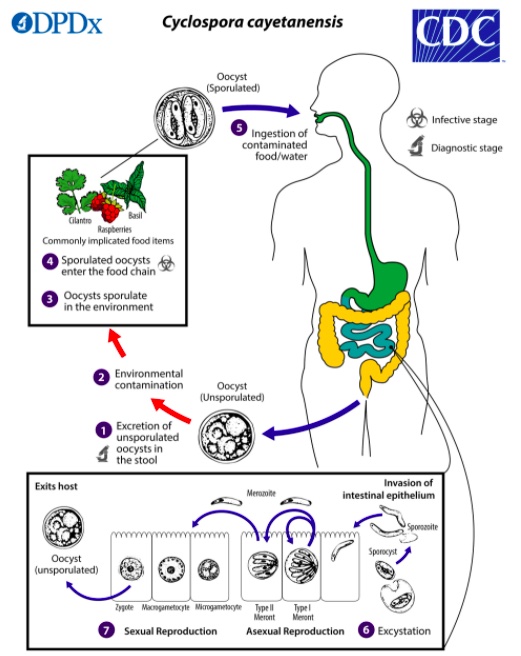Until 1990, when the first U.S. Cyclospora outbreak was documented, not much was known about the parasite native to tropical and subtropical climates. Thirty years later, many Americans can say they are more familiar with the single-cell freeloader than they ever would have hoped.
Contact Pritzker Hageman Cyclospora Lawyers for a free consultation.
Phone: 888-377-8900 | Text: 612-261-0856
Contact our Cyclospora Food Safety Lawyers Online
Over the last three decades, thousands of Americans have been stricken with Cyclospora infections. In the five-year period between 2016 and 2020 alone, more than 5,000 cases of non-travel-related cyclosporiasis were confirmed in the U.S. These infections occur when people consume food or water contaminated with human feces containing the parasite. There are no known animal reservoirs of the parasite.
More than 90 percent of Cyclospora cases occur between the months of May and August with case numbers peaking in June or July, according to one recent study. Imported produce including salad greens, herbs, berries, broccoli, cauliflower, carrots, and peas is the most commonly identified source of these illnesses.

The hallmark of a Cyclospora infection is diarrhea that is often described as explosive and watery. Other symptoms include abdominal cramps, bloating, nausea, loss of appetite, weight loss, and fatigue.
Untreated, these symptoms, which include bouts of diarrhea so frequent it is difficult to leave home, can last for months. The antibiotic combination prescribed to treat cyclosporiasis is Trimethoprim/sulfamethoxazole which is sold the brand names Bactrim, Septra, and Cotrim. There is not yet an effective antibiotic regimen for patients with sulfa allergies.
How Does Cyclospora Contaminate Food?
All parasites need hosts. And Cyclospora needs humans to complete their life cycle. People with Cyclospora infections shed oocysts, cysts containing fertilized eggs, in their stool. After one to two weeks in the environment, these cysts sporulate and become infectious. If the sporulated oocysts make direct contact with fruits and vegetables, or the water used to grow or process them, these foods are contaminated and will cause illness when ingested. When the oocysts reach the gastrointestinal tract, the sporozoites, (motile spores) break free from the cysts and make their way to the small intestine where they asexually multiply producing what will eventually become an oocyst.
Cyclospora infections are fairly common in developing countries with tropical or subtropical climates and are sometimes called “traveler’s diarrhea.”
Between 2013 and 2015, multiple Cyclospora outbreaks were linked to cilantro grown in Puebla, Mexico. Five of the farms health officials inspected were linked to the Cyclospora outbreaks in the U.S. Their findings prompted the U.S. Food and Drug Administration (FDA) to issue an import alert for cilantro from Puebla. These findings included:
- Toilet paper and human feces were found in growing fields and around facilities
- Inadequately maintained or nonexistent toilet and handwashing facilities
- Unsanitary food-contact surfaces
- Water that was used to wash cilantro was vulnerable to contamination from sewage/septic systems
Recent Cyclospora Outbreaks
2021 Cyclospora Outbreak
There is an ongoing Cyclospora outbreak in the U.S. with an, as yet, undetermined source. The FDA is testing samples of the suspected food source of the outbreak which has sickened 62 people.
2020 Fresh Express Bagged Salas Cyclospora Outbreak
Last year, Fresh Express bagged salad was identified as the source of a Cyclospora outbreak that sickened 701 people in 14 states. Thirty-eight people were hospitalized.
2018 Fresh Express Salads Sold at McDonald’s Cyclospora Outbreak
A 2018 Cyclospora outbreak linked to Fresh Express salads sold at McDonald’s restaurants sickened 511 people in 16 states, hospitalizing 24 of them.
2018 Cyclospora Outbreak Linked to Del Monte Vegetable Trays Sold at Kwik Trip Stores
A Cyclospora outbreak linked to Del Monte vegetable trays sold at Kwik Trip stores ended after sickening 250 people in four states.
Related
New Cyclospora Outbreak Sickens at Least 32 According to FDA
Cyclospora Salad Lawsuit Filed Against Fresh Express in Illinois
Cyclospora Salad Outbreak – Fresh Express Is a Repeat Offender
First Iowa McDonald’s Cyclospora Lawsuit Filed by Pritzker Hageman Attorneys
Pritzker Hageman Files Cyclospora Lawsuit Against Del Monte, Kwik Trip
Experienced Cyclospora Lawyers
Pritzker Hageman Cyclospora lawyers have successfully represented clients sickened in every major Cyclospora outbreak in the U.S. To request a free consultation about your potential case, please call 1-888-377-8900, text 612-261-0856, or complete the form below.
